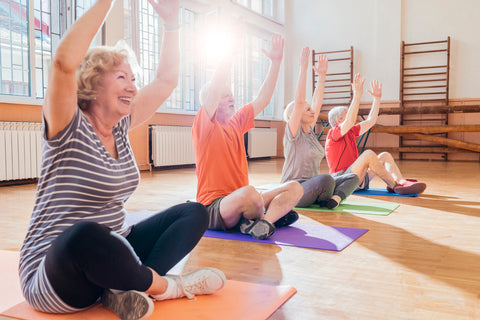Growing older is inevitable, and when it comes to caring for elderly family members, knowing that they're safe and comfortable in their homes can make the journey easier for both them and you. According to a recent AARP survey, about 77% of adults over 50 want to stay in their own homes as they age. With the average cost of a private room in a nursing home at over $8,000 per month, aging at home, also referred to as "aging in place," can be both a comfortable and cost-effective solution.
In this article, you'll learn how to weigh your options, and how to talk to your parents about their needs and plans. If your family chooses to support your parents in aging in place, you'll also learn practical tips for creating a home and lifestyle that will help keep them safe, happy, and healthy throughout their golden years.
Aging in Place vs. Assisted Living How to Decide
When you and your parents are deciding between aging at home or moving to an assisted living community, there are important questions to ask them. What level of independence do your parents wish to maintain? What type of lifestyle do they plan to lead? How much help will they need, if any, in completing everyday tasks? Read on to learn the key differences between assisted living and aging in place, and what kind of support each option has to offer your parents.
What is Assisted Living?
Assisted living is a popular choice for those who need help with everyday tasks but still want to maintain a level of independence. Assisted living and aging in place are two very different approaches to senior care. Assisted living refers to a residential facility where seniors receive assistance with daily activities such as bathing, dressing, and medication management. These facilities typically provide meals, housekeeping, and social activities. Assisted living facilities usually charge a monthly fee that covers accommodation, meals, and services. The cost can vary depending on the location and level of care required.
One key difference between assisted living and aging in place is the level of independence. In assisted living, seniors often have less autonomy as their daily activities are managed by staff members. They may have less control over their schedule and choices.
What is Aging in Place?
Aging in place, on the other hand, allows seniors to maintain their independence and make decisions about their daily routines and lifestyle. They can continue to live in familiar surroundings and have the freedom to set their own schedule and preferences. Aging in place implies continuing to live in the comfort of your own home while aging. This approach is increasingly preferred by many seniors who value the familiarity and emotional security attached to their homes.
However, it's also necessary to address the realities of aging. It's crucial to plan for things like safety, mobility, and health care. Remember, certain factors can significantly impair our abilities as we age, but with the right help and adjustments, these hurdles can be met and even overcome.
So which option is better for your family? That's not a question anyone else can answer for you. It's a deeply personal decision that hinges on individual circumstances and preferences. Take stock of your loved ones' health, desires, and personal situations. And remember, there's no right or wrong when it comes to making this decision. Choose what makes your family feel happiest, safest, and most fulfilled.
How Should You Talk to Your Parents About Aging in Place?

It can be tough to talk about the realities of aging, but conversations about where and how your parents want to spend their golden years can be made easier with a little planning. Firstly, make sure to choose the right time and place. When discussing the topic of aging in place with your parents, it's important to choose a comfortable and relaxed setting. Find a time when everyone is calm and not distracted, and choose a quiet and private space where you can have an open and honest conversation.
Approach the conversation with respect and empathy.

Understand that your parents may have mixed feelings about aging and may be resistant to change. Show them that you care about their well-being and want to support their desire to age at home, should that be their choice. Give your parents the opportunity to express their thoughts, concerns, and fears. Practice active listening by maintaining eye contact, nodding, and asking clarifying questions. This will help you understand their perspective and address their specific needs and worries.
Highlight the benefits and advantages of aging in place

Instead of focusing on the limitations or challenges of aging, highlight the benefits and advantages of aging in place. Talk about the comfort of familiar surroundings, independence, and the ability to maintain social connections. If you've noticed any changes in your parents' physical or mental health that might impact their ability to age at home, gently share your observations. Be specific and provide examples, but avoid sounding judgmental or critical. The goal is to open up a dialogue and find solutions together.
Be sure to express to your parents that they are not alone in this journey

Let them know that you are there to support them every step of the way. Offer to help with research, planning, and finding resources that can make aging at home easier and safer, and involve them in decision-making. Ask for their input and preferences regarding home modifications, healthcare options, and support services. This will give them a sense of control and ownership over their aging in place plan.
Keep in mind that you will likely need to revisit the conversation.
Aging is a continuous process, and the conversation about aging in place should be ongoing. Regularly check in with your parents to see how they are doing and if any adjustments or additional support are needed. Keep the lines of communication open and be prepared to adapt the aging in place plan as necessary.
Now, let's look at some things you can do to help your parents successfully age at home, should you and your family make this choice. Helping seniors age at home requires a lot of planning, resources, patience, and love, but the payoff can indeed be rewarding. By following these tips, you can ensure your loved ones are not just surviving, but thriving in their golden years at their own home.
14 Tips To Help Seniors Age Well At Home
Here are 14 practical tips your and your parents can follow to help them age well at home, ensuring that with your help, they can live out their golden years with dignity and independence.
-
Ensure their home is safe : Safety is a significant concern for seniors aging at home. Their homes may not be designed to accommodate their changing needs, and this can pose risks for accidents and injuries. Seniors may struggle with navigating stairs, slippery floors, or even getting in and out of the bathtub. Falls are the leading cause of fatal and nonfatal injuries among older adults, so ensuring a safe living environment is crucial. Removing trip hazards, installing grab bars in bathrooms, upgrading to non-slip flooring, and improving lighting can go a long way in reducing the risk of a fall.

-
Consider mobility limitations : One common challenge faced by seniors who want to age at home is limited mobility. As individuals age, they may experience physical limitations that make it difficult to move around their home freely. This can include issues such as arthritis, joint pain, or muscle weakness. Limited mobility can make it challenging for seniors to perform everyday tasks like climbing stairs, getting in and out of the bathtub, or even reaching items on high shelves. Finding ways to improve mobility, such as installing handrails, ramps, or stairlifts, can greatly enhance a senior's ability to age at home comfortably and safely.
-
Encourage regular exercise : Exercise helps maintain strength, balance, and mobility. Encourage your parents to engage in physical activities they enjoy. Check out some additional tips on how to maintain and improve balance as we age.

-
Keep them engaged socially : The CDC reports that lonliness and isolation are linked to serious health conditions, significantly increasing a person’s risk of premature death from all causes. Seniors who age at home may face a decrease in social interactions, which can lead to feelings of loneliness and isolation. This can be particularly true for those who live alone or have limited mobility. Social isolation can have negative effects on a senior's mental and emotional well-being. Regular interaction with friends, family, and community can boost mental health, so help them stay connected to people outside of the home.

-
Leverage Community Resources : Did you know that many communities offer resources specifically for seniors? It's worth exploring what's available locally. Perhaps a volunteer program for senior companionship exists, or maybe you can avail of free wheelchair ramps installation programs or transportation services for the elderly. They provide a myriad of benefits, including social connections and mental and physical health supports.
-
Arrange regular check-ins : Age-related illnesses can often creep in unnoticed. Regular check-ins, either by family members or a professional caregiver, are critical. Not only do these visits offer an opportunity to identify any potential health issues early but they also provide much-needed social interaction. New technologies such as the Camino Smart Walker can, with consent, track how your parent is moving inside and outside of the home. they can alert you or a caregiver to unusual activity or inactivity. Giving you peace of mind without having to call and check in - and we know how your calls don't always get answered.

-
Explore assistance options : Maintaining independence is also a common challenge for seniors who want to age at home. As individuals age, they may require assistance with daily activities such as cooking, cleaning, or personal care. However, many seniors value their independence and prefer to maintain as much autonomy as possible. Balancing the need for assistance with the desire for independence can be a delicate task. Seniors may need to explore options such as hiring in-home caregivers, utilizing meal delivery services, or adapting their home environment to make daily tasks more manageable.
-
Support their nutrition : A balanced, nutritious diet is crucial for everyone's health, but it's not always easy for older adults to do their own shopping or prepare their own food. Grocery and prepared meal delivery services are a great ways to ensure that your loved ones are getting the nutrition they need at home.

-
Embrace technology : Technology, such as medical alert systems and telemedicine, can help seniors age in place more safely and independently. How about a tablet for video calls so they can easily stay connected with friends and family? What about devices that monitor heart rate or blood pressure, and then directly report results to medical professionals? Various technologies are available today that can provide a sense of safety and also make the home more senior-friendly. Tech-assisted mobility devices such as the Camino Smart Walker not only help with walking, balance, and independence, but also contain AI to track gait and activity data to share with doctors and care teams.

-
Manage healthcare : Healthcare management is another significant challenge for seniors aging at home. As individuals age, they often require more frequent medical care and management of chronic conditions. Coordinating doctor's appointments, managing medications, and keeping track of health records can be overwhelming for seniors, especially if they have multiple healthcare providers. Seniors may benefit from enlisting the help of a family member or caregiver to assist with healthcare management, or utilizing technology such as medication reminder apps or electronic health records to stay organized.
- Acknowledge emotional and mental health : Physical health is important, yet discussing emotional and mental health can often be overlooked. Be sure to have open dialogues about these topics and consider involving professionals when necessary. Mental health resources, such as therapists and counselors, can be incredibly beneficial for elders struggling with this transition.

-
Prioritize financial planning : Financial constraints can pose challenges for seniors who want to age at home. The cost of home modifications, in-home care services, and healthcare expenses can add up quickly. Seniors may need to carefully evaluate their financial situation and explore options for financial assistance, such as government programs, grants, or long-term care insurance. Planning ahead and seeking professional financial advice can help seniors navigate the potential financial challenges of aging at home.

-
Enlist support : Family dynamics and support systems can play a role in the challenges faced by seniors aging at home. Not all seniors have family members or close friends who can provide the necessary support and assistance. This can make it more difficult for them to age at home, as they may not have someone to rely on for help with daily tasks or healthcare needs. Building a strong support network becomes essential for seniors who want to age at home, whether it's through family, friends, or community resources.

-
Advocate for your loved ones' needs : Remember, every senior's needs and preferences are different. Making sure their voices are heard, their needs are met, and the care and environment they receive respects their individuality is one of the most important things you can do. In essence, it's about quality of life. Revel in the love, cherish the moments, and make sure your seniors age comfortably at home, maintaining their dignity and independence.

In Conclusion
Aging in place is an excellent option for seniors who wish to maintain a higher degree of independence and retain a sense of familiarity amongst their surroundings.
Helping your elderly parents age well at home is a task of great importance, but it doesn't have to be overwhelming. By focusing on key areas such as safety, physical activity, social engagement, nutrition, and technological assistance, you can make their home environment as comfortable and safe as possible, reducing the costs and worry that come with getting older.




